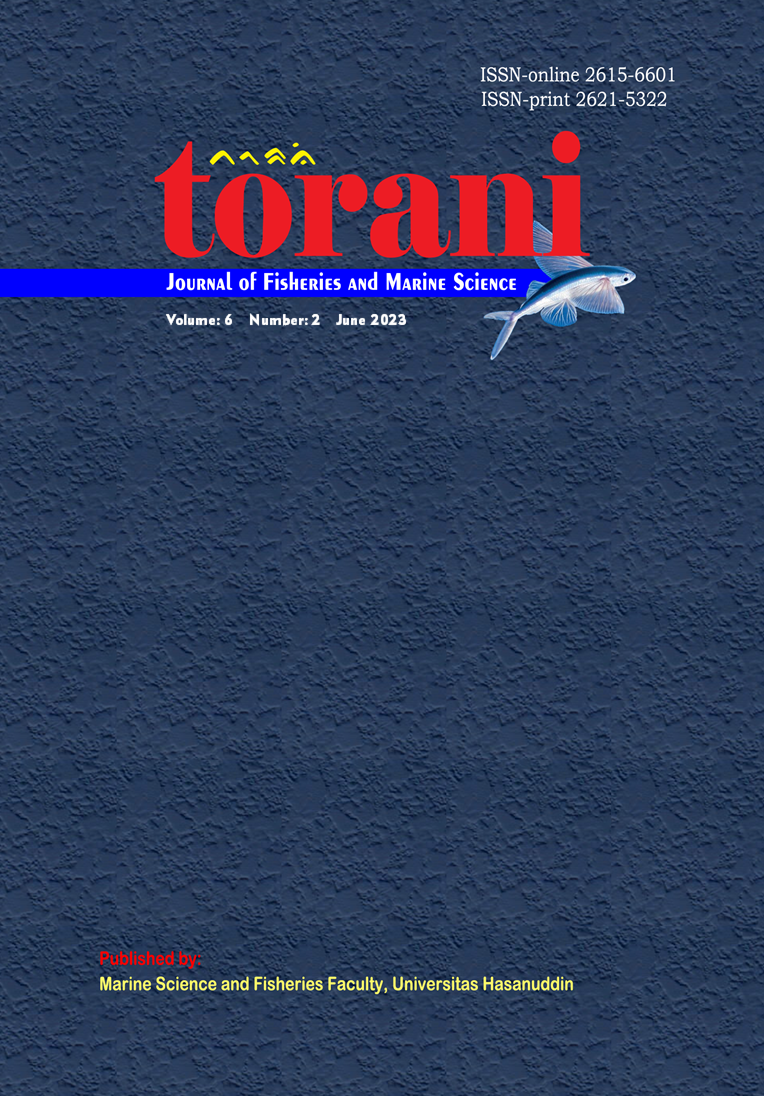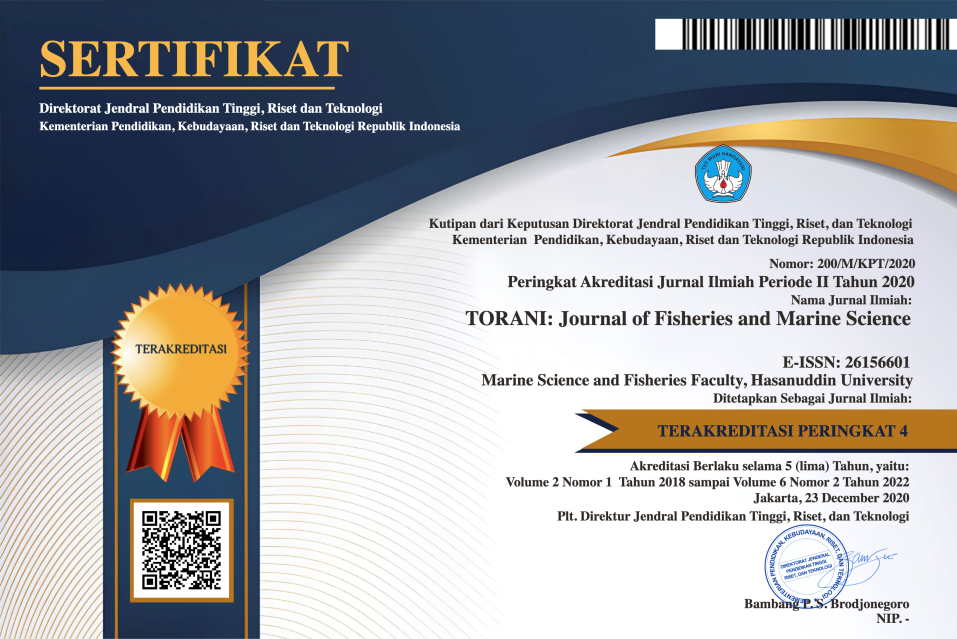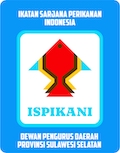Social Study of Tourism Perceptions in Idaman Mangrove Ecotourism of Balang Baru Village, Tarowang District, Jeneponto Regency
DOI:
https://doi.org/10.35911/torani.v6i2.26083Keywords:
ecotourism, mangrove, perception, social, tourismAbstract
This study aims to analyze the perceptions of visitors towards the existence of the Idaman Mangrove Ecotourism object. This research is a survey research using qualitative and quantitative approaches using questionnaire tools. This study was survey research by a qualitative and quantitative approach using a questionnaire tool. This research was done in Idaman Mangrove Ecotourism (IME) in Balang Baru Village, Tarowang District, Jeneponto Regency, South Sulawesi, Indonesia, from June to August 2020. The Non-physical aspects used the linear time function method for the tourists visiting IME. The number of visitor respondents was 40. The data were analyzed for social aspects towards perceptions of tourism using a Likert scale. The research results indicated that tourism perception belongs to the excellent category with 60%. The existence of mangrove ecotourism shows something unique and has a nature-based attraction, adequate facilities and infrastructure, and the comfort of activities that are good enough to meet the wishes of visitors.
References
Andronicus, Fredinan Yulianda, and Achmad Fahrudin. 2016. “Kajian Keberlanjutan Pengelolaan Ekowisata Berbasis Daerah Perlindungan Laut (DPL) di Pesisir Desa Bahoi, Minahasa Utara, Sulawesi Utara.” Journal of Engineering and Management in Industrial System 4(1): 1–10.
Bahar, Ahmad, and Akhmad Fauzi. 2020. “Coral Reefs Ecotourism Sustainability Assessment Based on the Integration of Government-Private-Local Community in Hoga Island, Wakatobi Regency.” In IOP Conference Series: Earth and Environmental Science, IOP Publishing, 12074.
Basyuni, M et al. 2018. “Developing Community-Based Mangrove Management through Eco-Tourism in North Sumatra, Indonesia.” In IOP Conference Series: Earth and Environmental Science, IOP Publishing, 12109 (1-8).
Davies, Martin Brett, and Nathan Hughes. 2014. Doing a Successful Research Project: Using Qualitative or Quantitative Methods. London: Bloomsbury Publishing.
Dewi, Anggi Novita, and Zainal Abidin. 2021. “Analysis of the Relationship of Service Quality, Motivation and Destination Image to Destination Loyalty: A Case Study of Wonorejo Mangrove Ecotourism in Surabaya, East Java.” Journal of Aquaculture and Fish Health 10(1): 46–55.
Duffy, J Emmett. 2006. “Biodiversity and the Functioning of Seagrass Ecosystems.” Marine Ecology Progress Series 311: 233–50.
Eunike, Agustina, Dewi Hardiningtyas, and Silvie Indah Kartika Sari. 2018. “Sustainability Analysis of Beach and Mangrove Tourism in Clungup, Malang Regency of East Java.” ECSOFiM (Economic and Social of Fisheries and Marine Journal) 6(1): 1–13.
Farid, Akhmad, Apri Arisandi, Akhmad Farhan Faridy, and Moh Wahyudi Priyanto. 2023. “Development of Mangrove Ecotourism Based on the Tourist Perspective in Lembung Village, Indonesia.” Journal of Environmental Management & Tourism 14(2): 425–34.
Graci, Sonya, and Logan Van Vliet. 2020. “Examining Stakeholder Perceptions towards Sustainable Tourism in an Island Destination. The Case of Savusavu, Fiji.” Tourism Planning & Development 17(1): 62–81.
Hakim, Luchman, Dian Siswanto, and Nobukazu Makagoshi. 2017. “Mangrove Conservation in East Java: The Ecotourism Development Perspectives.” Journal of Tropical Life Science 7(3): 277–85.
Hardy, Anne, and Leonie J Pearson. 2018. “Examining Stakeholder Group Specificity: An Innovative Sustainable Tourism Approach.” Journal of Destination Marketing & Management 8: 247–58.
Khadapi, Mu’ammar, Gusti Hardiansyah, and Sofyan Zainal. 2015. “Persepsi Masyarakat Desa Sungai Awan Kanan Terhadap Keberadaan Hutan Mangrove Di Kawasan Pantai Air Mata Permei Kabupaten Ketapang.” Jurnal Hutan Lestari 3(1): 108–16.
Kneeshaw, Katie, Jerry J Vaske, Alan D Bright, and James D Absher. 2004. “Acceptability Norms toward Fire Management in Three National Forests.” Environment and Behavior 36(4): 592–612.
Made, Sutinah, Hamzah Tahang, and Herdi. 2018. “Public Perception of The Existence of Coral Reef and Fishermen’s Public Perception of The Existence of Coral Reef and Fishermen’s Catch on Saugi Island of Pangkep Regency.” International Journal of Management and Applied Science 2(12).
Marasinghe, Sumudu, Priyan Perera, Greg D Simpson, and David Newsome. 2021. “Nature-Based Tourism Development in Coastal Wetlands of Sri Lanka: An Importance–Performance Analysis at Maduganga Mangrove Estuary.” Journal of Outdoor Recreation and Tourism 33: 100345.
Murtini, Sri, I Komang Astina, and Dwiyono Hari Utomo. 2018. “SWOT Analysis for the Development Strategy of Mangrove Ecotourism in Wonorejo, Indonesia.” Mediterranean Journal of Social Sciences 9(5): 129.
Nurhayati, Nurhayati, Amar Maruf, and Nur Arafah. 2018. “Persepsi Dan Sikap Masyarakat Terhadap Pengembangan Ekowisata Mangrove Bungkutoko Kendari.” Jurnal Ecogreen 4(1): 43–51.
Ragavan, Neethiahnanthan Ari, Hema Subramonian, and Saeed Pahlevan Sharif. 2014. “Tourists’ Perceptions of Destination Travel Attributes: An Application to International Tourists to Kuala Lumpur.” Procedia-Social and Behavioral Sciences 144: 403–11.
Rahmila, Yulizar Ihrami, and M Arief Rahman Halim. 2018. “Mangrove Forest Development Determined for Ecotourism in Mangunharjo Village Semarang.” In E3S Web of Conferences, EDP Sciences, 4010.
Ramli, Fatin, Zaiton Samdin, Awang Noor Abd Ghani, and Mohamad Roslan Mohamad Kasim. 2018. “Factors Affecting Users’perception Towards Conservation of Biodiversity in Matang Mangrove Forest Reserve (MMFR), Perak, Malaysia.” International Journal of Business and Society 19(S1): 26–36.
Riduwan, M B A. 2007. PT Penerbit Alfabeta Skala Pengukuran Variabel-Variabel Penelitian. Bandung.
Singarimbun, Masri, and Sofian Effendi. 2019. Metode Penelitian Survai. Jakarta: LP3ES (Lembaga Penelitian, Pendidikan, dan Penerangan Ekonomi dan Sosial).
Siow, M L et al. 2013. “Scoping the Potentials and Pitfalls of Rural Tourism Policies: Constructivism as a Theoretical Lens.” Pertanika Journal of Tropical Agricultural Science 36: 157–72.
Sugeng, Bambang. 2022. Fundamental Metodologi Penelitian Kuantitatif (Eksplanatif). Yogyakarta: Deepublish.
Sugiyono, Sugiyono. 2013. Metode Penelitian Kuantitatif dan Kualitatif Dan R&D. Bandung: ALFABETA Bandung.
Suwantoro, Gamal. 2004. Dasar-Dasar Pariwisata. Yogyakarta: Andi.
Tahang, Hamzah, Amiluddin Amiluddin, Faisal Amir, and Firman Firman. 2018. “Economic Valuation of Mangrove Forest Ecosystem in Sinjai.” TORANI: Journal of Fisheries and Marine Science 1(2): 71–80.
Tuwo, A, and J Tresnati. 2020. “Coral Reef Ecosystem.” Advances in Biological Sciences and Biotechnology 1: 75–104.
Tuwo, Ambo. 2011. Pengelolaan Ekowisata Pesisir dan Laut: Pendekatan Ekologi, Sosial-Ekonomi, Kelembagaan, dan Sarana Wilayah. Brilian Internasional.
Untari, Dhian Tyas. 2018. Metodologi Penelitian: Penelitian Kontemporer Bidang Ekonomi dan Bisnis. Cetakan Pe. Purwokerto Selatan: CV. Pena Persada Redaksi.
Utari, Dwi Retno. 2017. “Pengembangan Atraksi Wisata Berdasarkan Penilaian dan Preferensi Wisatawan di Kawasan Mangrove Karangsong, Kabupaten Indramayu.” Jurnal Manajemen Resort dan Leisure 14(2): 83–99.
Yoeti, Oka A. 2008. Ekonomi Pariwisata : Introduksi, Informasi, dan Implementasi. ed. Bambang Pribadi. Jakarta: Kompas Media Nusantara.




















